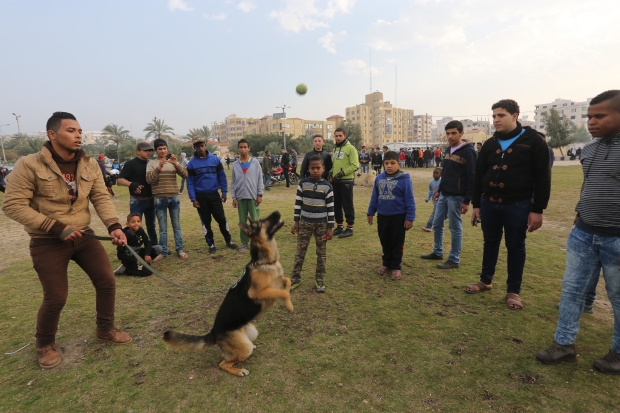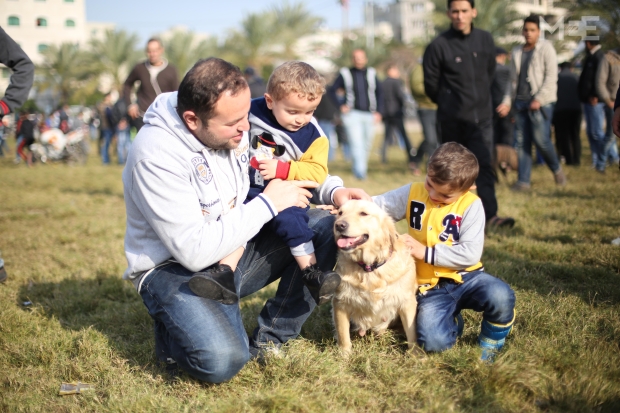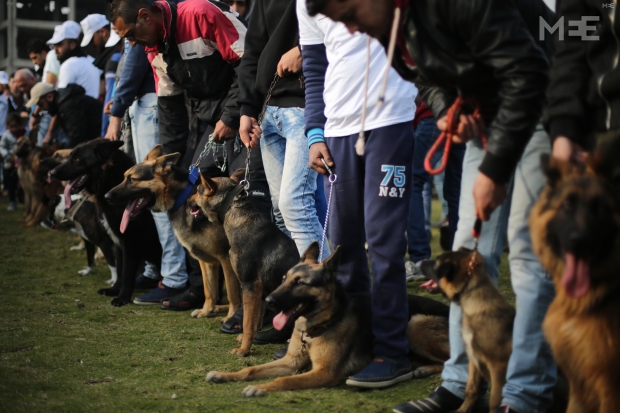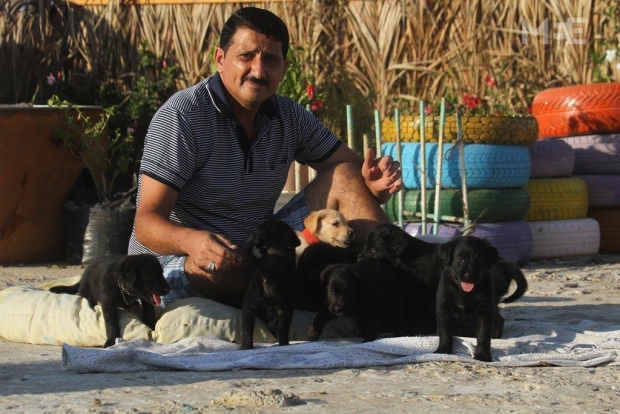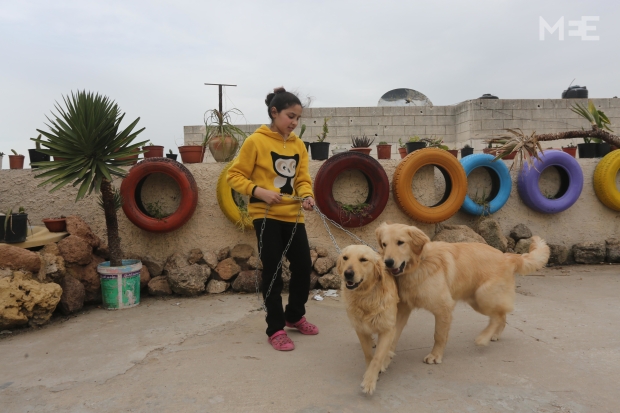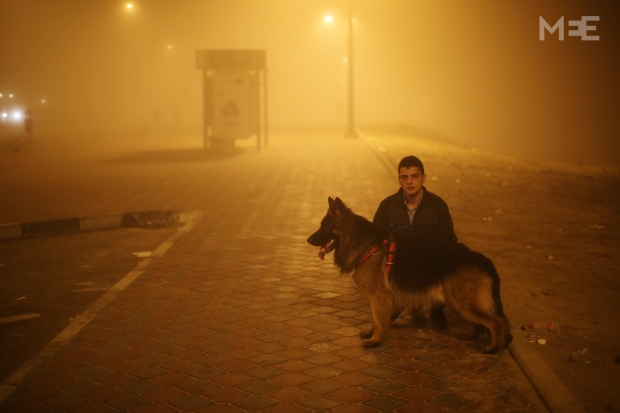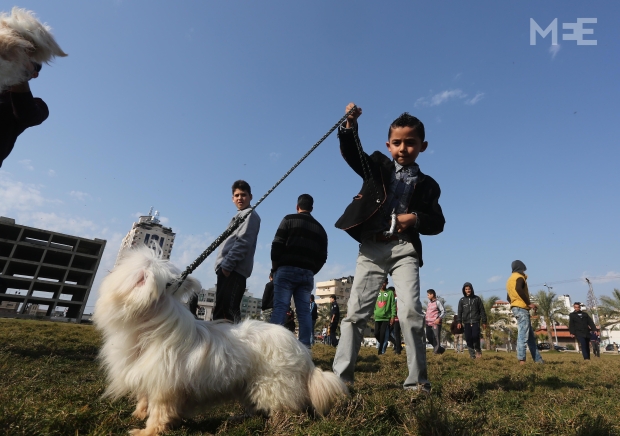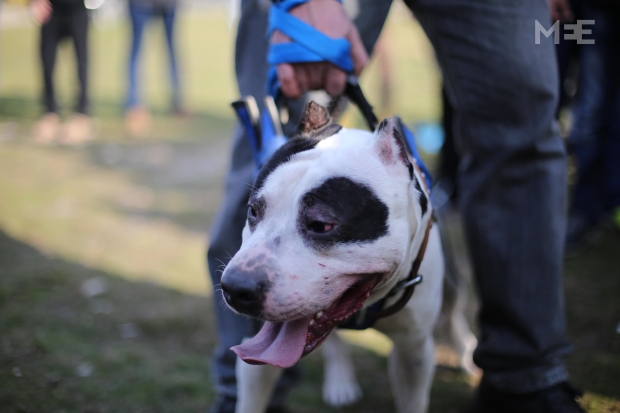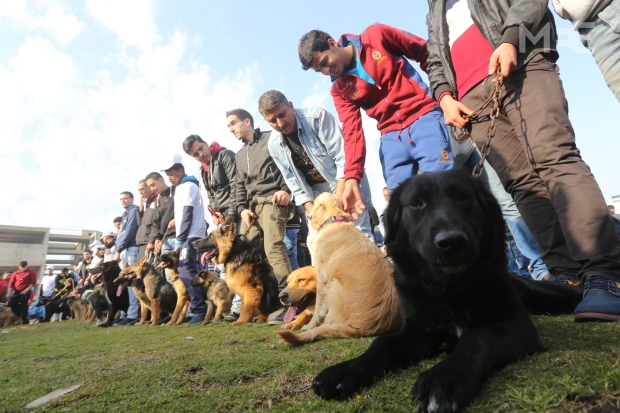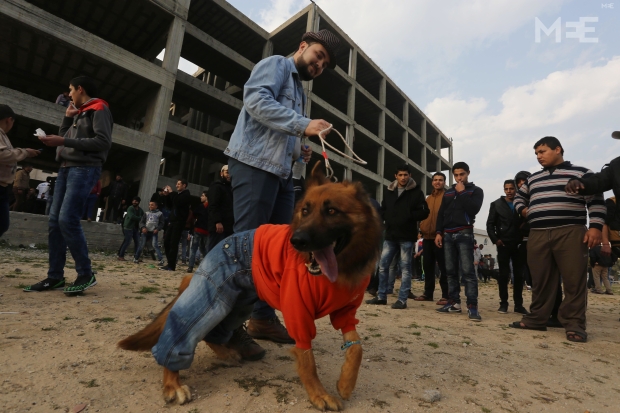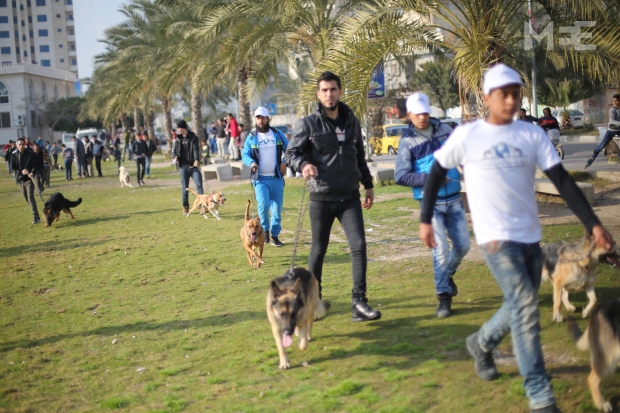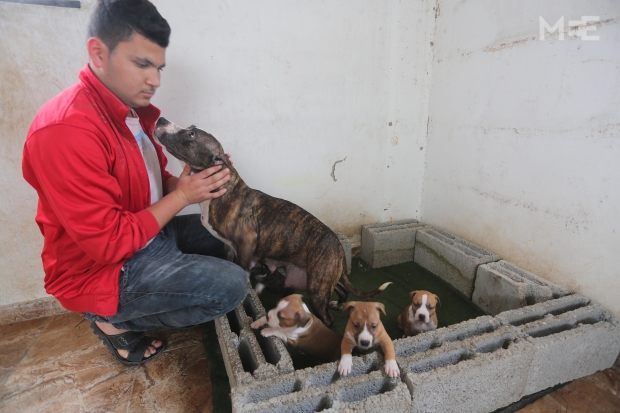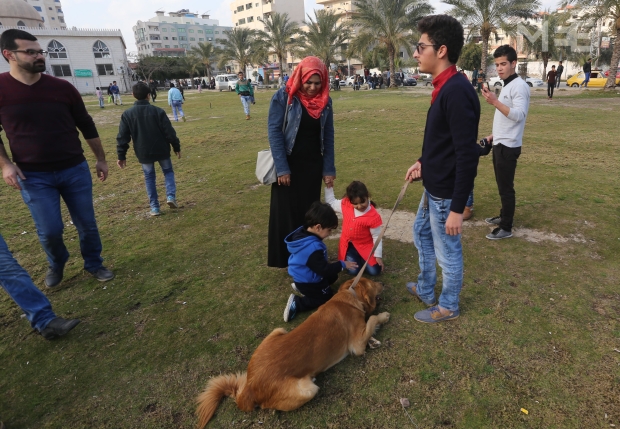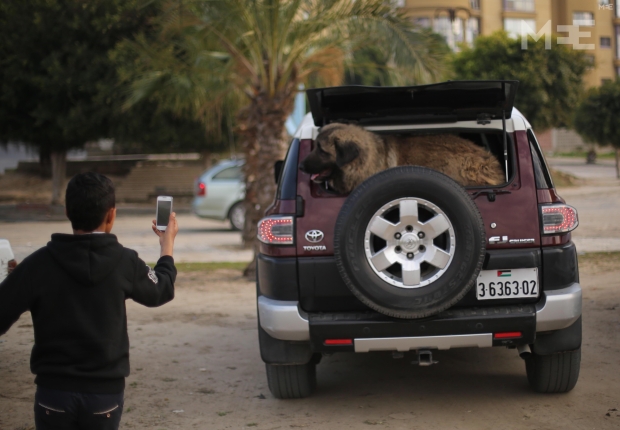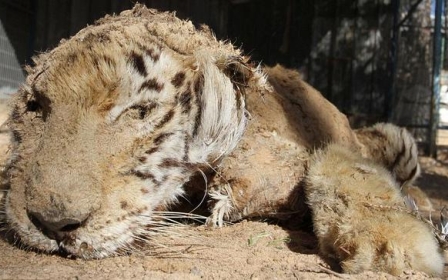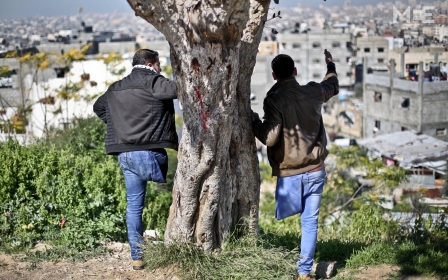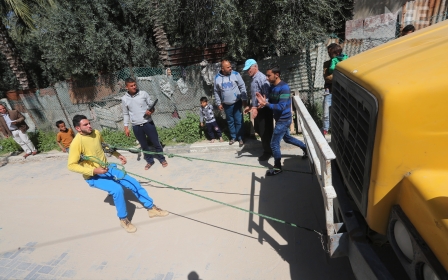A Gazan’s new best friend: Dog craze sweeps the Strip
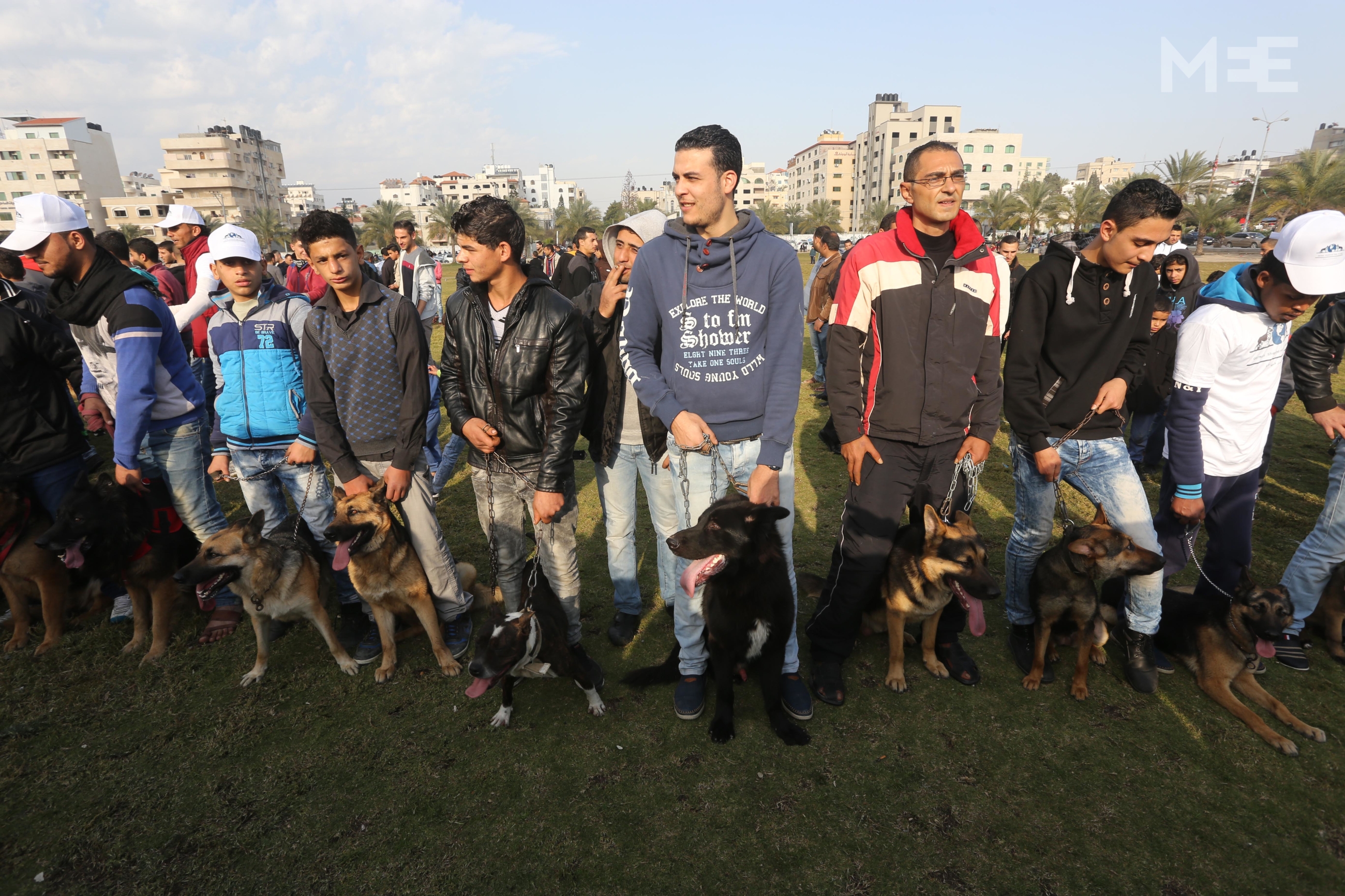
It is a peaceful spring morning on Gaza’s Mediterranean coastline with the sun glinting off the water, but then the stillness is broken as dozens of dogs rush down to the beach for their morning runaround spraying sand in their wake.
It is an unusual scene in a Muslim community that traditionally does not regard dogs as man’s best friend.
The generally perceived aversion to dogs is based on the Islamic teaching that dogs are nijs (unclean/impure), and according to certain hadith (prophetic teachings) in which it is advised not to keep dogs in the home.
In one hadith, for instance, Prophet Muhammad, according to Abu Hurayrah, said: “Whoever keeps a dog, except a dog for herding, hunting or farming, one qiraat (measure) will be deducted from his reward each day.”
However, this has long been a topic in which there have been a range of religious pronouncements and at this time in Gaza, a more relaxed view seems to be spreading.
It's a sunny day and young people come down to the beach to discuss the animals. They admire the various breeds and crossbreeds and discuss the difficulties of raising dogs whilst living under siege. Some of them have travelled to Europe as students, where dogs are well-loved family members and they have brought this interest and affinity back home to Gaza.
Over 40 young men stand on the beach, each with at least one dog in hand. Given that very few of these young people have regular, well-paid jobs to go to, they find other ways of passing the time and sharing interests whilst living under an all-encompassing blockade.
Gazans keep pets at home - cats, birds and fish – just like other people do, but it's only recently that social media has brought about a new interest in dogs. Thanks to the culture of photo tagging, people from north to south Gaza have been connected by their mutual interest in pets.
Abulkhair is an agricultural engineer, and also a specialist in treating dogs in Gaza. “I suppose it’s my way of escaping the daily pressures and ominous political reality which is beyond our capacity to solve,” says Mohammed Abulkahir, while walking his dogs along the sunny beach.
Abulkahir used to fear dogs, but his views changed after his daughter took a liking to a dog and the family began to care for the friendly four-legged mutt.
“My daughter loves the dog, so I now have another member of the family. In fact, we now seem to have adopted seven dogs, and the numbers keep growing,” he says with a smile.
In recent years, looking after these pets has become challenging, he says, as it has become more difficult to bring in medications and vaccinations for treating the dogs.
“Supplies of vaccines for puppies, which they usually have to start taking at around 45 days old, are often unavailable when blocked at the border-crossings,” he adds.
“Even when supplies get through, the hand-over time is long, and the vaccines have usually expired,” he says.
Maher Jaber, 39, is a dog enthusiast who established a Facebook page that in Arabic translates to "Gaza German dogs". He was surprised by the massive public interest and interactions both on-line and in person.
“We have become the first youth gathering to take care of dogs in Gaza,” he says with a wide smile, as he lets his dog off the lead for a run on the beach.
His brown and black dogs Ramos and Stella appear well-trained and friendly, which is something Gazans are not really used to considering the fact that the only interaction they usually have with dogs are the aggressive dogs used in Israeli military operations against the besieged Gaza population.
Ramos is having fun on the beach and leaps into the air, surrounded by other dogs enjoying the morning sun and fetching balls thrown by their owners.
“In the beginning, I thought the population around here wouldn’t welcome dogs - considering dogs have always been seen as dirty, but now I am happy to see the community is welcoming them,” he says as he looks around at his friends and their family pets while children nearby play with puppies.
Regular meet-ups for dog owners have become popular and people like to show off their dogs and compare notes on breed and temperament.
“In Gaza, we have about 60 percent of the global variety of breeds,” Maher says but he goes on to explain that Israel’s blockade restricts the import of dogs. The high shipping prices mean that it costs an estimated $500-$1000 to import each dog into Gaza.
After the Facebook page was established, more Gazan merchants became willing to import different animal food and other canine supplies from the outside world.
The global pet and pet goods industry is huge in the Western world, and in Gaza, dog trainers are now in demand as families adopt the canine friend. “Businesses need trained guard dogs for their properties,” says Hussain al-Akhras, who trains guard dogs for security purposes.
“We do face difficulties in training dogs, as we neither have the best quality tools nor the training facilities - even basic training material can cost $800 because of the siege,” he says, before adding, “but the culture of ‘man’s best friend’ is now flourishing in Gaza.”
But Ahmed Laham, a 28-year-old dog owner, says social media publicity around Gaza’s new family friends has started a new culture in Gaza.
“People are obtaining more information on how to take care of dogs properly and are helping to start remove the negative stereotypes of dogs as being dirty animals,” he says as he strokes his German Shepherd affectionately.
Laham, who owns a barbershop, says that his Facebook platform has given him access to more information on how to fight diseases which threaten dogs.
But his dream is to create a public platform recognising animal rights in general. There is a special bond, an unconditional love, between a good master and their trusting, loyal dog - a bond which can last a lifetime, from one family generation to the next. You can tell a lot about a person, says Laham, from how they treat their pets.
Abulkhair says that the power cuts last winter meant that families suffered and many young pups died in the cold – “but now with the new Facebook page, we hope the flow of information is easier between different people on how to keep dogs warm, but also we demand supplies of canine vaccinations be allowed through the crossings”.
His other pleasure is seeing public opinion and mentality regarding dogs turn to a more positive, welcoming one. This is a big change in Gaza, where locals once saw dogs as dirty street creatures instead of beloved family members and constant companions.
“When I first brought the dogs, none of my relatives would come to visit, but now everyone comes,” he says, as his dogs leap around near the beach, ears back and clearly having fun.
“The old taboo is slowly fading away, and dogs are creating family fun in Gaza,” he smiles.
“Despite difficulties, I am delighted to have helped bring 21 new dogs from abroad to families here, through my Facebook page,” says Jaber, as public requests grow for family dogs.
For him, despite any financial difficulties, $100 is worth paying for each dog per month, to cover the costs of their food and vaccinations. He says his dogs calm him down, teach him patience, and help him focus on the good, simple things in life, instead of the difficult politics and wars in the Arab region.
He sits with his friends discussing the origin of his dogs and the irony behind how he got them from beyond Gaza’s locked down borders two years ago.
“My dogs' parents are Kisel from Germany, and Wenny, from Israel,” he smiles, showing the birth certificates of his dogs to his two children.
In a strange way, the dogs have created a kind of unity with both Israelis and the West through love of the family canines. “I know now we have relatives in Germany and in Israel - and the connection with Gaza always makes me smile,” he says as he tucks the dogs into a car and drives away, the dogs looking back through the window, tired at the end of a long day of play.
Middle East Eye propose une couverture et une analyse indépendantes et incomparables du Moyen-Orient, de l’Afrique du Nord et d’autres régions du monde. Pour en savoir plus sur la reprise de ce contenu et les frais qui s’appliquent, veuillez remplir ce formulaire [en anglais]. Pour en savoir plus sur MEE, cliquez ici [en anglais].


